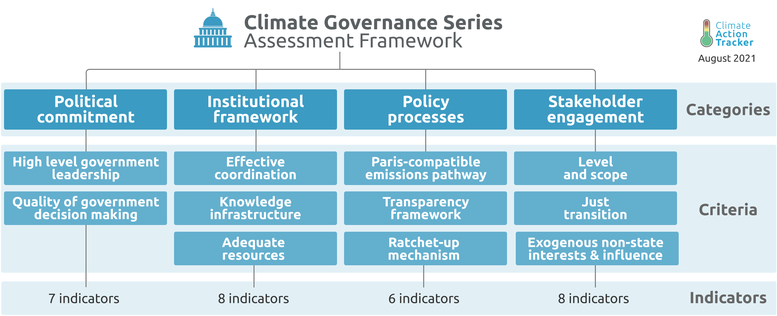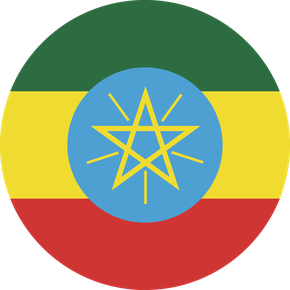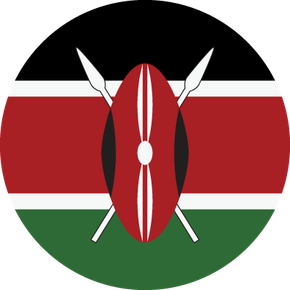Climate Governance Series
Summary
Under the Paris Agreement, governments have committed to limiting temperature increase to well below 2°C above pre-industrial levels and pursuing efforts to limit it to 1.5°C. Achieving this objective will require halving global emissions by 2030, and reaching net zero CO2 emissions by 2050 and all gases around 2070, with negative emissions thereafter.
Governments in all countries play a critical role in enabling this transformation, which involves action from all aspects of society and the economy.
The Climate Action Tracker (CAT) tracks the progress of countries towards achieving the climate targets they have set for themselves under the Paris Agreement and what the combined effect of these commitments and policies mean for global temperature levels at the end of this century.
In this series, the CAT expands on its country analysis to evaluate the ability and readiness of national governments to enable the required economy-wide transformation towards a zero emissions society.
Assessing Climate Governance

Our assessment analyses four aspects of governance covering key enabling factors for effective climate action:
- the political commitment of the government to decarbonisation,
- the institutional framework it has put in place to achieve its emission reduction targets,
- the processes it has established to develop, implement and review mitigation policies, and
- its ability and willingness to engage with relevant stakeholders on policy development.
The Climate Governance Series seeks to offer a standardised and replicable approach to assessing a government’s ability and readiness to achieve the required transformation, highlighting positive developments and areas for improvement.
Notwithstanding the desire for standardisation, our framework is a living document and we occasionally revise the number or make-up of our indicators. For complete details, see our methodology page.
Countries covered
In 2019, we analysed Argentina, Australia, Indonesia, Kenya, the Philippines and South Africa. In 2020, we updated our analysis of Kenya and South Africa, and added Ethiopia to the Series. In 2021, we updated our analysis of Indonesia and added Ghana to the Series. In 2022, we analysed Brazil, Nigeria, Egypt, Rwanda, and Senegal (en français). In 2023, we added Colombia to the Series.
Quick links
 Climate Governance in Argentina
Climate Governance in Argentina
 Climate Governance in Australia
Climate Governance in Australia
 Climate Governance in Brazil
Climate Governance in Brazil
 Climate Governance in Colombia
Climate Governance in Colombia
 Climate Governance in Egypt
Climate Governance in Egypt
 Climate Governance in Ethiopia
Climate Governance in Ethiopia
 Climate Governance in Ghana
Climate Governance in Ghana
 Climate Governance in Indonesia
Climate Governance in Indonesia
 Climate Governance in Kenya
Climate Governance in Kenya
 Climate Governance in Nigeria
Climate Governance in Nigeria
 Climate Governance in the Philippines
Climate Governance in the Philippines
 Climate Governance in Rwanda
Climate Governance in Rwanda
 Climate Governance in Senegal
Climate Governance in Senegal
 Climate Governance in South Africa
Climate Governance in South Africa
Want to learn more?
We discussed our profiles of Senegal and Rwanda as part of a December 2022 virtual event on charting a path to ambitious climate action in Africa in 2023 (recording and presentation here) and our Egypt profile as part of the 2022 Middle East and North Africa Climate Week (recording and presentation here).
Stay informed
Subscribe to our newsletter